#the good cop in a corrupt system thing is actually the most interesting thing about him
Explore tagged Tumblr posts
Text
Always fascinated when I see people assume Goro fans dislike River's romance because he's a cop, while simultaneously loving that Goro is a corporate shill or whatever, when literally no Goro fan I have ever interacted with dislikes River or his romance because he's a cop.
#t: wench on fandom#i've written about this at length elsewhere so I'm not gonna do it again here but this just always gets under my skin#river's romance doesn't work for me for a lot of reasons#like i'm not into domestic shit with kids or having awkward family dinners with a dude i barely know#i found him very pushy when valerie was trying to let him down gently#the good cop in a corrupt system thing is actually the most interesting thing about him#but the game just kinda drops that#ugh
15 notes
·
View notes
Text
Wardens: Cops By Another Name
So, in writing my Dresden fanfic I've once again stumbled upon another interesting quandary in the Dresdenverse and that's just how remarkably pro-cop the series is. Not in like, its representation of the Chicago PD which someone tried to point out to me was not "copaganda" because there were "good cops AND bad cops" Okay. Let's talk about Wardens then. So, Wardens unequivocally are the police of the wizard world at least for human mages. They answer to the authority of the White Council and the Head Warden, they're allowed to use lethal force in order to enforce those laws, and members are generally pulled from the populace policed (e.g. other wizards). With maybe the exception of Morgan, they're all generally portrayed the same was as the CPD are. They're also about as easy to corrupt and abuse their power as normal police, are given extrajudicial power to murder pretty much whoever they want if given a good enough "reason", and are able to carry out that act using a means of force unavailable to the rest of the population they police. Warden Donald Morgan IN THE FIRST BOOK, deliberately tries to misinterpret the Laws of Magic in order to kill Harry, who Morgan sees as a dangerous liability to leave lying around. So he just like. Tries to lie to Harry about how the Law works. Either that or he just doesn't understand the Laws of Magic. Kinda fucked up don't you think? Isn't it even more fucked up that if Harry didn't know about the Laws of Magic, Morgan could've just killed him right there in that Chicago park and the series would've just ended? Like. There's not really a criminal justice system it seems in the White Council aside from the Doom of Damacles, a laughably terrible system, that puts people who want to help reform people instead of kill them in harm's way. The only other trial we see is when a poor kid is laughably fucked up from using mind control magic and we just had to kill the fifteen-year old don't you see??
Like, sure, the Doom of Damacles is obviously a terrible shitty system that you could say is a reflection of how old and backwards the White Council is but so little of the Wardens or even the Laws of Magic are shown in the same light. Like, Morgan, is our "quintessential" bad cop, but like NOTHING BAD HAPPENS TO HIM FOR ABUSING HIS POWER! If anything in the end he's given a heroic death despite the fact that he was a terrible Warden who most definitely killed innocent people. He almost killed Harry!
Not only could he have killed him, he could've killed him easily. All Wardens, after all, are given anti-magic swords, purpose-built to negate the magic of 'renegade' mages and warlocks that they're trying to murder bring to justice. Nobody else is given these. Only Wardens, using a method that only ONE WARDEN knows how to use.
All based on, not the letter of the law, but on Morgan's interpretation of it. Just like cops do. They don't have to actually understand the law. Just try to stomp on anyone they perceive as dangerous. I wonder how it would've gone if Harry wasn't a tall White guy. You think Morgan a guy raised in a different CENTURY doesn't have weird internalized views about people different than him? Y'know. LIKE HARRY?
Plus, like... what would've even happened if he did!? Who would investigate Morgan? Other Wardens?! You think a community as insular as The White Council would actually bother with doing something when a Law of Magic hasn't been broken? Do you think they're going to believe a warlock or Lawbreaker over a wizard and Warden of the White Council? After all, breaking the Law(s of Magic) is one of the most fundamentally evil things you can do. So in order to fix that, we need to use summary execution via military police, no matter if they're a child or an adult.
After all: KILLING SOMEONE WITH AN ANTI-MAGIC SWORD DOESN'T COUNT AS KILLING SOMEONE WITH MAGIC. SO THAT MAKES IT OKAY, DOESN'T IT? (And as an aside, uh, what do you mean killing someone with an anti-magic sword, doesn't count as killing them with magic.
Like, I understand that a certain level of semantic bullshit can be argued with a lot of things in any Fantasy setting but like... What? You're telling me a sword forged with magical properties does not count as killing people with magic, even if its magical properties are used to kill them? Like. If I stab someone with a flaming sword and they burn to death, does that count?)
#the dresden files#dresden files#thinking way too hard once again#but honestly i think this shows what the series thinks about police a lot better than#the chicago pd#in jim butcher's universe#cynpost
41 notes
·
View notes
Text
Man... So yeah... I've got conflicting feelings about Batman: The Caped Crusader... On the one hand, the art direction and the backgrounds? I can genuinely dig them! The diversity and number of people of color in the main cast? Fantastic! And I'm down for them trying out new takes on old or obscure rogues! The tone and atmosphere can be pretty good at times, and I appreciate the 1940's setting and the weird little oddities the show has because of the retro setting.
But to me, by far the most interesting thing about the show is that it doesn't really feel like a show about Batman. But rather that the show is about the systems of corruption that make Gotham the way that it is and stay that way. Batman has 0 qualms about beating the shit out of the cops, and I dig the hell out of that! Bruce often feels secondary to what Barbara, Renee, and Harvey are up to. The show feels like it's about Gotham! And what Batman is here to do and does is secondary to the other people living in it and trying to change things for Gotham. And I can dig that about this series! And honestly, seeing Barbara and Renee just being complete and utter badasses throughout the whole show and always being the best, most competent, incorruptable people in the room? Kinda delightful! Batman just gets to be a chump sometimes. And it's pretty funny to see the men go down with the easiest of punches while the ladies seem to be able to tank anything coming their way! Love that for them! But honestly... It really does seem like the show is a LOT more interested in the struggles of the poor, the people of color, and the women of the city than it is with the perspective of the rich, white, cis, male society that we usually see! So that's a direction I really appreciate with the show!
But on the negative side, BOY HOWDY does that animation look sloppy sometimes. And in fact, the animation style is often far too close to that of Scooby-Doo for my liking! When I started the 5th episode with Gentleman Ghost, I felt a little baffled because I just put on Batman... But what I was seeing looked like it was literally pulled straight out of Scooby-Doo! The only real animation details that made it NOT look like Scooby-Doo was MAYBE the eyeliner on some of the characters. And even then, only maybe. Like it's not exactly surprising, but still a bit of a bummer. :p Also this is probably just a me thing, but I wish that Batman was just more successful when it came to saving people. Like, I entirely got that they wanted this show to be for adults so they they could raise the stakes and actually kill characters off... But there are just a few instances that feel like a bummer and I wish that Batman was given a chance to save them... Speaking of... Spoilers below the cut!
Man! I'm bummed out by what they did with Harvey! He's my favorite! He's my boi! I love he! And he just gets killed off! Like... I was genuinely interested to see what they were doing with him. It wasn't my ideal direction for Harvey, but it was interesting! And I would have liked to see more of him! I would have liked to see more of the dynamic between Harvey and Two-Face! And their dynamic with Barbara was genuinely very fun to see! But yeah... They killed him off and he's very VERY unlikely to come back! I think that it would have been more interesting if they tried to keep him around. In that last episode, he asks what kind of happy ending he can have where he gets out of this. And honestly, I think that it would have been more fun and challenging for them to try and answer that question! But nah. They just killed him off. Siiiiigh... Also when thinking about the themes of the show, them killing Harvey off feels a little... Troubling... So at the very least, if Caped Crusader does return for a second season... I sure as FUCK hope that Harvey haunts the ever-loving FUCK out of the narrative! Cause honestly, I could have stood to see more of this interpretation of him! But alas! Siiiiigh...
Also lol. Apparently my prediction of the direction that they were trying to do with this Two-Face and Harvey was spot on. And that's kinda hilarious! :P
29 notes
·
View notes
Note
when do u think bnha became unsalvageable?
i think bnha might've always been slated to become that way from the get-go, with the protagonist being an aspiring hero and heroes being superpowered cops.......
that said while copaganda shows will always be suspect to me, i'm willing to watch them for entertainment value if not moral backbone lol. so i think bnha could've still been a somewhat fun show about these kids going to superpowers school and learning how to use superpowers better. the major failure points that stand out to me are:
mva
endemption
i'll talk about #1 first since i'm sure that's gonna be the most controversial coming from me lol. dgmw i actually love mva and i think it's one of the better-written (if not best) arc of the series, BUT it was so good and set up so many expectations that the series ultimately just could not live up to. mva was very strong imo because, in giving its villains depth, it dug into the fabric of bnha's society and tried to illustrate, like, how did this happen, why are these people villains? and by and large, the answer to that was poverty and the societal alienation of vulnerable populations (children, abuse victims, mentally ill ppl, queer ppl, "mutants," etc.)
and this was good and interesting but this was Also Bad because mva added complexity to the world of bnha but that was ultimately a complexity that horikoshi couldn't execute. i'm not interested in a story that makes systemic change secondary to scolding marginalized people for reacting to how they've been treated. i would even prefer some kind of liberal "change from the inside" story that at least focuses more on the theme of systemic flaws than one that focuses on how the people systemically wronged are actually the bad ones and we have to fight them for 400 chapters.
look, i'll even drop the whole "the lov did nothing wrong" bit for a moment. sure, bnha doesn't have to throw away all believability and have everyone forgive the lov just like that, but it's always going to be fucked to me that bnha's story and fans are obsessed with the lov ~owning their crimes~ when (takes a deep breath) the government ordered the clandestine executions of people who would make the hero system look bad. and the story barely wastes any breath talking about the corruption of the hero system and higherups lol. which brings me to the second point.
endeavor started out as a character that embodied everything that was wrong with quirk/hero society. he was one of those very early downsides we saw of bnha's world: the publicity/public image of heroes superseding the contents of their actual character, and the value of quirks superseding the value attributed to their human bearers, to the point that domestic abuse and rape is seen as an option to make one's genes/one's power stronger. this was a good set-up! i was intrigued! but again, horikoshi couldn't follow through.
endeavor's character eventually shifted away from making a point about hero society to becoming one of the emotional focal points of the story, especially in the todofam subplot. "waaah tumblr user dabistits you just hate when people change for the better!" and yeah i do kind of hate how an abuser having sad feelings immediately gets him prioritized over the people who suffered because of him tbh! but personal feelings aside, i would say that endemption really marked the point where bnha swung hard into depicting characters as good or bad not through the actions they take but through their alignment with either heroes or villains.
endeavor and hawks are the most obvious in this. in contrast to the obsession of making sure villains repent and "do the right thing," endeavor/hawks' actions are either forgivable, pitiable, or simply necessary. several years of spousal abuse and at least 10 years of child abuse don't earn endeavor so much as a lecture (no, being told to stop being pathetic doesn't count), and hawks' execution of twice—not much different than lady n's executions—is dismissed through a press conference and never addressed again. there's a distinct line drawn between "heroes (who sometimes do bad things!)" and "villains," such that anyone aligned with the heroes is deemed to be "good, deep down," and generally more morally superior or redeemable than villains. consider the fact that someone like gentle (youtube crimes) or aoyama (blackmailed 16 y.o) were held to higher standards of proving themselves than someone like endeavor or hawks. i'm not gonna lie, these story beats are all uncomfortably real, except that when real live people do endeavor or hawks things i see them unquestionably as counterrevolutionary enemies, not protectors of the peace lol.
the decision to have endeavor transition from minor antagonist to a major supporting character was, imo, a big turning point in the ethos of bnha. i think in many ways it was a symbolic shift, but also a mechanical one in terms of how the story was going to be told going forward. the problems about hero society that were continually introduced at the beginning (ostracizing quirkless people and ppl with "dangerous" quirks, the valuation of powerful quirks over people, "fake heroes," all of the lov stuff) took a backseat to Stopping The Big Bads, with marginalization as flavor text instead of a genuine area of contention between heroes. think about the difference in deku confronting endeavor during the sports festival compared to how all other injustices were dealt with afterward... because the readers have to be convinced that endeavor is Ultimately Good, the heroes stopped challenging him, and in stopping challenging him, they lost one of the major ways through which the heroes of the series wrestled with societal issues.
but whereas the way the heroes handled corruption and violence within their own ranks became simplistic and non-confrontational, with mva, so many aspects of dealing with and interrogating the status quo and societally-accepted injustices were pushed onto the villains instead. but since the villains must be defeated as villains, despite being the main carriers of social critique now, their messages were also torn down/deprioritized in favor of enacting bnha's vision of a cohesive conclusion wherein the villains answer for their crimes. so instead of making the heroes challenge anything, hori shifted this burden onto the villains, in the process making most of them some kind of vulnerable/marginalized and with opinions on the matter, only to ultimately assert that the issues they raise are less narratively important than a restoration of peace.
33 notes
·
View notes
Text
Ace Attorney 4-3, Investigation 1. In keeping with Gavin being surprisingly friendly for a prosecutor, I love the way 4-3 spins directly out of our developing relationship with him specifically.
Klavier Gavin is the only prosecutor ever to voluntarily hang out with the protagonist prior to the big conclusion of their arc. Some prosecutors have showed up to hang out in future titles; In fact, Gavin does too. But this is the first time we've actually been able to get to know them before the showdown.
And you can see why, too. Gavin's not only the friendliest prosecutor. He's also the only one who. Like. Has a life outside the courtroom. Other than Edgeworth being a sentai fanboy, I guess.
This one's going to have to be in two parts.

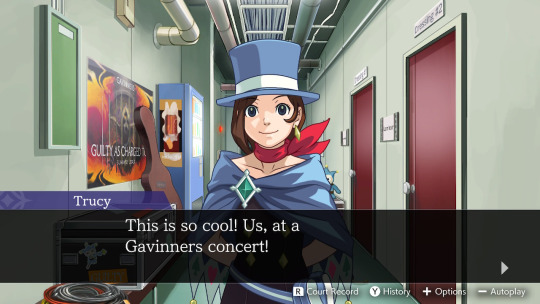
Rockstar prosecutor Klavier Gavin is a rockstar. So we're going to set a chapter of the story at a rock concert. His rock concert. What a great idea.

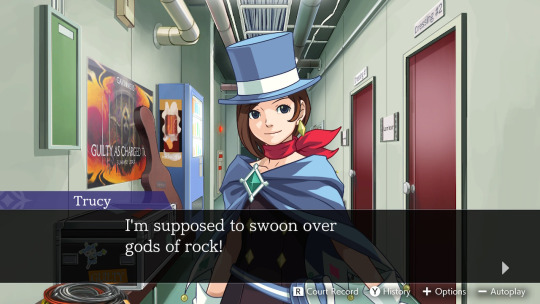
OH YOU CAN BARELY TELL THAT A MAN WROTE THIS
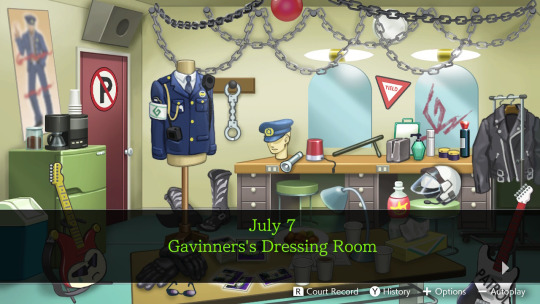
The least believable thing in the entire Ace Attorney universe is that the Gavinners somehow have a successful rock career. Rock is a counterculture movement, giving voice to the unheard.
It is physically impossible to get any farther from counterculture than literally cops. This is it. The extreme distant end from counterculture. Who the hell would buy cop-themed rock?
The Daily Wire wishes conservative media was as well-received as the Gavinners.
It's especially bizarre when you consider that we're in the Dark Age of the Law, a period of time when the criminal justice system is so widely known to be corrupt and brutal that pop culture came up with a name for it while it was still happening. Everyone knows that the justice system is broken and exists solely to persecute the innocent but we're all gonna buy tickets to watch a bunch of cops play guitars and cheer for how cool prosecutors are.
Nonetheless, this is such an unassuming setup for a murder. Why would there be a murder? We're here to make music. We're here to make cop music. Can we have one nice evening? But no. Gavin and his guest star Lamiroir take the stage and....

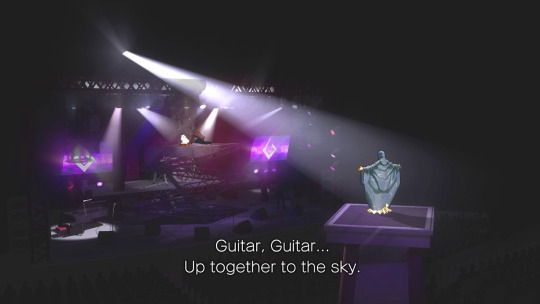
It does not go well. In fact,
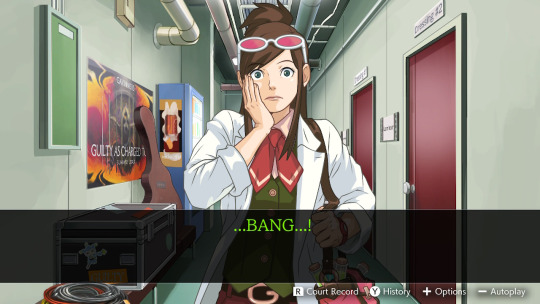

It goes aggressively not well. Fortunately, the victim lives long enough to tell us that Lamiroir saw him get shot.
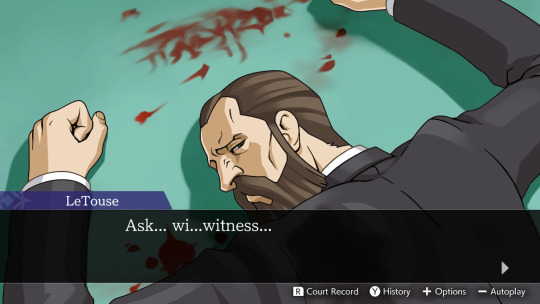
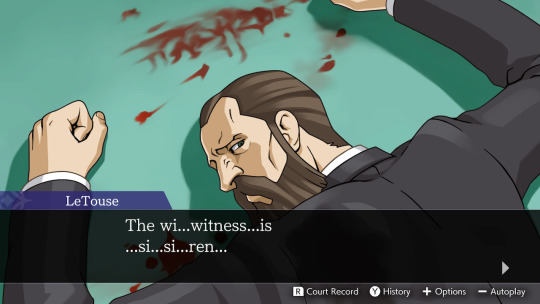
Romein here speaking in code to give us a riddle to solve. I usually hate cryptic moments like this when characters use a short window of opportunity to speak in cryptic tongues rather than deliver useful information. But with Romein, it makes sense. The man has been shot and ours is not his first language. He's wracking his brain right now to find correct enough words to use.
In any case, this sets up our crime for chapter 4-3. A classic Whodunit in an enclosed space - complete with a vanishing killer who somehow teleported out of the room despite us breaking in through the only exit moments after the gunshots were heard.
A limited number of people have access to this backstage area and half of them are cops. One of them shot Romein LeTouse. Which means now would be a good time to talk about the cast of characters involved in this case.
We have two sets of characters here. First is the guest singer Lamiroir and her entourage.
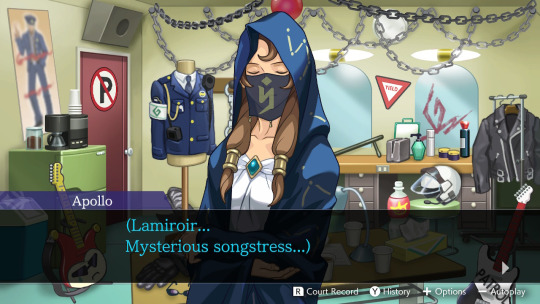
The mysterious and lovely Lamiroir, a famous international singer who is probably the real reason all those people are here. Come for the legendary international celebrity but also cheer for the fucking cops so they don't get mad and shoot tear gas into the crowd.

Siren of the Ballad Lamiroir is easily our most interesting character in this case. Not originally from her "home country" of Borginia, her entire persona is a manufactured illusion.
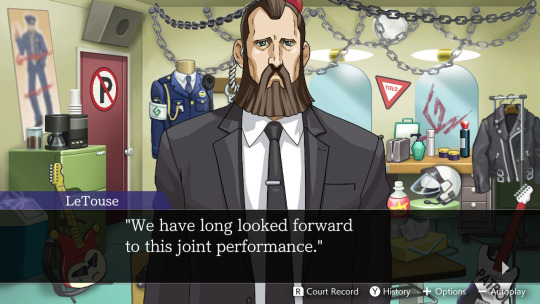
As well as her manager and translator Romein LeTouse whose name makes me sad that our local salad buffet place shut down during COVID. He's one of only two people involved with this case who can interpret for Lamiroir, who speaks only a foreign language. That's a problem, seeing as he's our vic--

Oh, never mind, she can speak Japanese "English" just fine. They were doing that for publicity. Convenient!
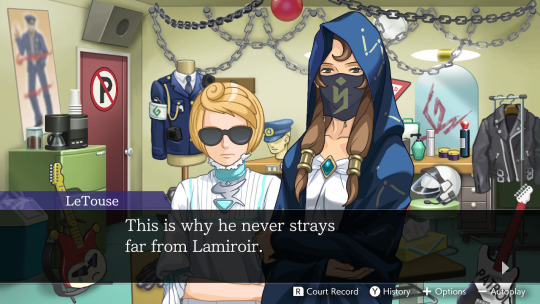
And her blind child pianist Machi Tobaye. He and Lamiroir seem like they make for quite a pair. These two, I can believe having a famous musical career. Machi, incidentally, can "also" only speak his native language just like Lamiroir but I'm sure that won't be important.

These two characters form an inseparable performance duo from a foreign land, whose relationship with each other and their late manager will carry much of the intrigue for this case.
The other key set of characters would be our cops.

Of course we have Ema Skye, our embittered forensic scientist whose talents are wasted as a field detective. Of course, she's definitely off the suspect list on account of the fact that she was with us when the gunshots were heard.
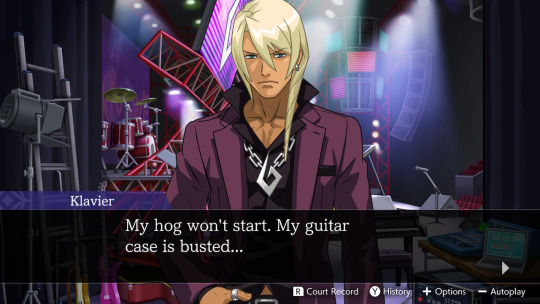

There's Prosecutor Gavin who is having the worst day. He probably didn't dunit but then again it wouldn't be the first time, would it?
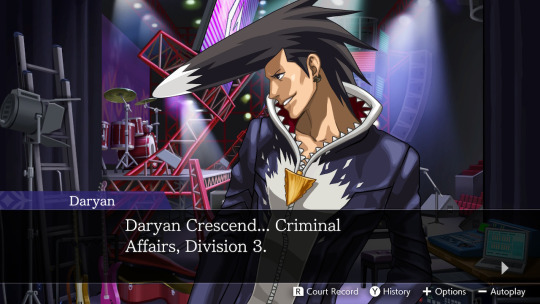
And Detective Dickhead. His hair truly must be seen to be believed. He is attempting to pull off the Japanese Thug Pompadour in a way that can only be described as, "Hello, Officer."
Just like Ema, Gavin and Daryan both have airtight alibis as well.

It's hard to get a stronger alibi than "Thousands of people saw me onstage while the murder was taking place."

AND THEN THERE'S THIS ASSHOLE
That's it. That's all we get. Glimpses of the Golden Fucko as he bazingas around dodging attention. Okay, dude. Way to not look suspicious, I guess.
That's it. That is our small cast of characters aside. It's not a lot of people to look into. In fact, Mysterious Golden Fucko aside, nobody seems capable of fitting everything we know about this mystery.
Continued in part 2.
9 notes
·
View notes
Text
hello this now a legend of the galactic heroes blog i will post essays on it at a whim
hi how you doing this is a big block of text that has light spoilers for LOGH and talks at length about its discussion of autocracy vs democracy, how it balances itself and how it evolves it into a conclusion. I'm gonna put the separation after the first paragraph and if the style seems interesting to you, click keep reading and enjoy the maddened rants of a man who writes to process things.
I think one of my favorite parts of Legend of the Galactic Heroes, a sentence I will write much more often in the coming years, is the weight it puts on actual discussion of merits and complications of imperialism and democracy, and how at the end of the day, there's no true correct option between either.
As the son of a nation that had just left a brutal dictatorship before I was born, I was raised with school teachers who in fact ran from cops in protests, fought secret police, ran counter-propaganda campaigns and defended their rights in the middle of the street, shouting and bleeding. And the pitch I got for democracy was always, well, military dictatorship is unacceptable, and the vote is the most important weapon in a population's arsenal.
LOGH mostly agrees with the sentiment, but it doesn't put republican democracy as the end-all be-all of good government as a matter of fact, which was a fascinating decision to me. The democrats as a faction are mostly corrupt or ineffective politicians who balance their self-interest by either flat-out lying to the population or throwing lives into blenders so they can push a ufanist agenda for an election.
They applaud each other as they figure out ways to remain in power while doing nothing themselves, and even though one or two of them are ultimately trying to Do The Right Thing, the system's checks and balances make it so they're being, well, checked and balanced by people who do not have the population's best interests in mind. We even have one of those same politicians say it out loud: we are parasites, we get paid to suckle on society and offer nothing, we are glorified bank attendants who should only be concerned with how to spend tax money but here we are, deciding who lives and who dies simply because we can.
Meanwhile you have the imperials-- descended from literal space nazis, genocidal maniacs who slaughtered billions or even hundreds of billions depending on how you interpret one of the history episodes -- and they're not much better before Reinhard shows up. A lousy, dumb class of aristocrats grown fat and complacent on the food and effort of the lower classes, with no desire to treat others who don't dress in their fancy suits as fellow human beings.
99.9% of the population will never affect public policy or even be targeted as the main beneficiary of policy, unless one of their young daughters is attractive enough for a 70 year old pervert to kidnap her and maybe listen to her requests every once in a while. The show is not subtle about who you're watching-- they scream Sieg Heil and are all German. It explicitly expects you to balance whatever you feel about the Lohengramm Dynasty with the historical context, both in the show and in real life.
So the question is thrown at the audience, at first by inferring it and then explicitly in season 2: assume for the sake of argument there's change coming for both systems, would you rather live in an aloof, corrupt democracy or a benevolent, yet inevitably complacent autocracy?
And I strongly feel that in most other stories, Reinhard would be depicted as a wide-eyed idealist that would slowly but surely succumb to his own vices, only to become a bad emperor killing all his incumbents and repeating the same problems of the original empire that destroyed billions of lives. It would be a cautionary tale about how absolute power corrupts absolutely or whatever, and about how only through freedom fighting with wanton abandon can we create a world worth living in. There would be nothing no one could tell Yang or Julian or whoever that would convince the audience that they didn't only have good points.
But no, LOGH is genuine about the question: it's a benevolent autocracy, at its heart, you can trust the emperor's words at face value. The values have shifted in such a way that the vices of yesteryear will not be around at least for a little while, and democracy itself may be on its way out due to the sheer lack of consistency it let fester at its breast.
The question is not whether or not having a decent-looking approach to government is a trick by the space nazis, the question is whether it's okay for you to give up your personal freedoms if you can be sure you will have your interests still considered, and that some level of oppression will happen on both sides either way. The show asks you whether, once removed from morality or ideology, you will go with the tax fraudists or with the pompous fucks, if you can be sure your life will objectively be easier on the latter and will always be unstable due to the former's natural changes.
The democratic systems in place in the galaxy by the time Reinhard takes over the Empire are shattered not just because of external actions, but because they were rotten to begin with. There was simply no way for them to survive in their form at the time. You have democrats constantly talking about the wonders of democracy while making sure most of the population will never experience those in the first place.
Parallel to that, in Iserlohn Fortress, the literal last bastion of democracy, you have Yang Wenli being pressured to become a military dictator to "put things in their place" and "make sure things work", showing you how little faith people have in the actual system and how much faith people have on him. But Yang has none of it-- taking over would make the entire exercise pointless.
Yet he never says Reinhard is an inherently bad leader, and never stops acknowledging the immense progress that he forced upon the galaxy. Both Yang and Julian constantly mention how, since Reinhard is a beloved monarch, he is technically more democratically-supported than any politician in Heinessen ever was. And that's not nothing-- it is imperative to actually engage with this conversation for those characters, because they are essentially fighting for a system that literally nobody in the universe has faith in, because they just saw it eat itself alive.
What the ideals of democracy eventually shape up to be is the belief that one man should not be the end-all-be-all of government policy, regardless of the kind of system they have. A king, a president, a prime minister, whatever-- other people's livelihoods should never come down to a single person's whim without any sort of recourse for criticism. Democracy, when stripped from its bells and whistles, becomes the ability to make yourself heard for good or ill. Autocracy, likewise, becomes the incapacity to reach anyone other than through personal, non-official means. Neither is future-proof, but one of them gives future generations the resources to fight the scourge of corruption, while the other does not.
And this conclusion takes one hundred and ten fucking episodes. It takes multiple revolutions, the rise and fall of entire governments, conspiracies, probably an entire planet's worth of alcohol. But it gets there! It sits you down and expects you to talk back as it talks about checks and balances, taxes, education, the measure of a man, the place of honor in politics, the whole damn thing!
Yet it never feels like the show is putting imperialism on a pedestal either, because you see, beyond a shadow of a doubt, how illuminated despotism always falls: the complete and utter lack of systems that aren't nepotistic as a rule means snakes will slither into nests, no matter what. Yes, the king might not be corrupt-- what about the second in command? The third? The fourth? If the fifth person in the chain is corrupt, then literally everyone under them also is. Because it's a system based on personality and connections, and not necessarily in what's best for each role.
Even though Reinhard tries his hardest to avoid this, and explicitly chooses people whom he trusts and knows can do a phenomenal job, he cannot change the nature of politics. The complete lack of systems designed to counter corruption in autocracies aside from someone coming in and saying "Eh, fuck it, just kill them" means smart enough disruptors will find a crack in the armor, and they will scheme and lie and conspire against the trust that glues the entire system together.
And cracks they find, and it works. You can bring down an entire system in one day by simply undermining the right person. There is no chain of command strong enough in an autocracy to survive the death of a king. Whoever the next king ends up being, things will drastically change, far more than they would if a president were to be assassinated. And, again, the show asks and expects you to form an opinion-- but is that worth it? Is the thought of building an entire castle on top of an exposed central rock inherently a thing of hubris? Is there no middle ground that can make the best of both worlds function perfectly? Is the most democratic-leaning autocrat still not democratic enough? Is the most benevolent military governor still unacceptable?
Ultimately, the conclusion LOGH seems to reach is that a parliament is a good buffer to a king so that the puck does not begin its movement in the same place it stops at, but also so that the people have a more direct way to speak their minds to a centralized ruler other than literally becoming friends with the right people. While much less directly discussed than the grander conversation, it seems that LOGH ascertains that the speed of decisions an autocracy can achieve is not a bug, but a feature, and should be utilized for the greater good, but that aristocrats and the king's friends should not be the only thing stopping a genocide if the king so wishes, and they should definitely not simply be capable of being ignored.
It's not really showed as a victory for either side. Reinhard doesn't live to interact with the new system, and Julian doesn't believe he'll ever stop undermining the Empire, even though he got them to compromise. People will keep dying for what they believe in, but now for far less romantic reasons and for far less charismatic leaders. The legend isn't just over, the legend is dead.
But that's history, that's how it works-- you don't fight until you're the only one standing, you fight until, somehow, both people lose, and then you keep going. The conversation about politics will literally never end, because there is no right answer. There is no holy book explaining how to perfectly govern a population. There's only the messy attempts imperfect men and women put forth, and the shape they take after being grounded through the gears of progress and war. And at the end of the day, this is all just different people trying to figure out a way to better put tax money where it should go, otherwise we all starve next winter.
Legends are told after the fact, and ultimately, they're just stories simplified so that they can better inspire us. The galaxy keeps spinning, unpreoccupied with the affairs of man and their ideals.
#gineiden#legend of the galactic heroes#logh#Julian Mintz#yang wen li#reinhard von lohengramm#UNLESS YOU'RE IN A CULT#AT WHICH POINT YOU'RE THE BANE OF THE GALAXY#THE ONLY TRULY EVIL FACTION#TOTAL TERRAIST DEATH
4 notes
·
View notes
Text
atlhs had yet another hot springs scene -_- it was trite and unnecessary, I thought we might be free after the last ‘overhearing the gals’ scene but I guess I was being optimistic



^what happens when you try to change the corrupt system from the inside. but actually I do think it’s an interesting thing to highlight, the ‘what are you willing to sacrifice now for the power to do something ‘good’ later’. anyway this is what makoto’s future is going to be if we let atlus turn her into a cop
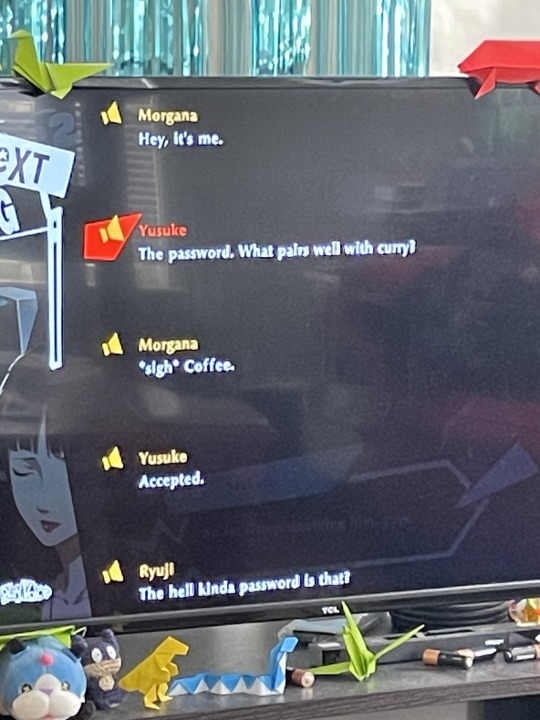

yusuke sounded so serious lmao






akane :( also the vibes of the ceo is like a guy asking ai to do his homework. also I figured out why I don’t like his design, he looks like tony stark




since makoto’s usually the most level-headed of the group, I like when she gets pushed past reason—even when it was somewhat about proving herself, the core of it was driven by wanting to protect people who were helpless…




lol




took one of the screencaps because I was like. hi sae! I like that akane gets a phantom thief costume, I hope we get some interesting shadow stuff… although, I’m wondering what impact forced monarchy has on a psyche…? Or if it’s just flooding the shadow with power? anyway I just started the stealth part, zenkichi’s so slow lmao his old man knees
2 notes
·
View notes
Text
Minneapolis
A few days ago, Luke my middle Son, suggested a documentary he had watched.
Its on Youtube... runs about 1 hour 40 minutes if interested. Titled "the Fall of Minneapolis".
It affected him. He couldn't really decide what to think of it, or how it affected him but it did.
This is awesome in my opinion, as any movie/documentary, sci fi, murder, drama.... if it affects you some way, it did its job. Not to many do that any more. Irks me when a highly marketed film gets me nothing more than a soft "oh..."
Patti has a hard time with "sad" movies, and if she knows it will be sad, she won't watch it. Where as I will, because I know it may affect me.
This documentary, deals with corruption within Minneapolis's government, plus some negatives towards the media. All after the George Floyd incident.
I had issues with the incident. The tactic shown on his shoulder/neck looked to be a little ruthless... but I'm no cop. In the photo an officer nondescript looking up, almost into a yawn.
I heard early on an autopsy report he had several drugs in his system, including fentnyl. For what ever reason here in the flatlands that subject seemed to disappear thru the rest of the circus to follow.
....
The media imo, currently is unregulated, and holds no standards to prove credibility. News today, is all about "what sells news". They all copy off each other believing each knows what they are talking about. The days of Cronkite/Huntley/Brinkley telling everyone that eating shit is good for you..... is gone. America believed in these guys, and they were a good solid news source most of the time.
I have to include the company that made this documentary in this group too. As I find very few that are honest real news sources that have no sway with politics or money. I don't know this company, or their work ethic.... so I'm tossing them into this box.
My favorite go to, but hard to just sit down for an hour and listen is "Democracy Now". I've seen it attack Obama, Trump, and other favorite people of hi exposure. Although they are totally a nonprofit news source, there could still easily be a dirty secret. Who is a good neutral news source? I have no idea anymore.
......
This documentary is presented very well, with purpose, and easy to follow. It definitely wasn't a low budget film.
As the documentary unfolds, it starts a few minutes before George Floyds incident. And then shows and translates all body cam videos and audio.
This part was very enlightening. I was very surprised to say the least. This incident from these moments wasn't really dealing with bad cops, but a guy that was out of control.
Once he died, there was an immediate autopsy. This autopsy, within hours became "null and void", as higher ups wanted a different autopsy done by their own person (federal or state, I can't remember).
The 2 autopsy's didn't line up. The second one was vague, compared to a detailed report.
The first one went away, showing way more that could affect the outcome of these cops. It was not permitted by the courts.
Most of the body cam videos were also not permitted by the courts. Many of these videos for some unknown reason were never released to the public for viewing.
Private phone videos were allowed, one notorious one we have all seen, taken by an off duty fire fighter.
Some things that I didn't know: The arresting officer for George Floyd was black. The fire dept. didn't receive correct address from 911 for unknown reasons, thus the 20 minute delay of their arrival for an 8 block drive. The cops called for an ambulance as soon as they got him on the ground.... long before he passed. The "ruthless" hold I commented about before, was an actual move fully recognized and approved by the police department in each of the officers training manuals. The higher ups all denied that that move was allowed (think, the cops were trained to use this move, and it was "ok" to do it). The police department, pretty much let the rioters "have" precinct 34, even though it wasn't in any real jeopardy at that moment of "evacuation".
.......
Ok, so you got the jist. A lot of horrible things came from this incident, all across our country.
This incident presented as it is by this documentary company shows possibility that it actually was completely different than what the media portrayed or the higher ups in the city allowed. This shows that it is so very easy to take video out of context. Much easier than I have ever suspected, and changed my impression from here on out.
.....
I can't believe/understand the agenda of these folks that controlled everything. Are they that ruthless to let all that damage, death, and ruining the careers of good people, just so they look good in the publics eye?
Yeah, I'm leaning towards the direction presented by this documentary. I'm not 100% in, as it is just another news company. But it affected me too, enough I'm still thinking about it today. And yup, thats a good thing.
3 notes
·
View notes
Note
i'm not necessarily arguing against you, i'm just curious, how do you think safety and people abiding the law should be held up without any police force? obviously corrupt police, police with too much power, etc, are no good, but i personally can't imagine what cops would be replaced with if even noncorrupt cops aren't acceptable. i'm interested in hearing your thoughts.
Hey anon,
The thing about cops is 99% of the time, they don't actually prevent crimes. They come in after crimes have already been committed. What we need is an approach that is about preventing them. We have tried police reform worldwide. It doesn't work. It never works.
The entire system of policing is based on punishment, not prevention. In fact, police aren't even obligated to TRY to protect people.
What we need is to tackle to problems at the root. Look at crimes and go 'why does this happen?' and make sure people don't end up in the situations that lead to that. Complete overhaul of social and community problems, universal basic income, guaranteed housing, etc. A safety net that makes it so people who are being abused feel safe coming forward from the beginning, with no risk of them losing their home, job, children, etc. A society for children and young adults where their emotional needs are cared for and they don't have access to dangerous weapons to shoot up schools. When someone has a mental break, mental health professionals especially trained in de-escalation show up, not cops. A society where we make active efforts to disentangle young boys and men from the patriarchy, lowering the amount of rape and abuse we see. Community programs in SPADES to put a stop to street violence. We need to decriminalize drugs, sex work, etc., and create support systems and networks so sex work can be safe and drug addicts can be safely rehabilitated without just throwing them in jail.
MOST crimes could be solved before they happen by this.
And yes, there are crimes out there that likely can't be prevented. You might not be able to stop Joe serial killer by giving him these outlets. But these are anomalies, actually quite rare, and we would have people for them as well; trained in forensics, investigation, etc., with the goal of preventing crimes from occurring, not just punishment.
We also need to see rehabilitation and restorative justice as the goal. Some countries are getting a lot better about that aspect.
The thing about police is they haven't been around forever. They're a recent institution (relatively speaking) that we've become reliant on, by design.
Police abolition can't happen in one day. It's a process that requires a huge amount of overhaul of our existing systems. It's something needed in every country. Police rule us, and there's nothing neutral about that. It's unacceptable.
#anonymous#haro talks#i do recommend googling like 'police abolition' topics bc they're all smarter than me
10 notes
·
View notes
Text
hey so it turns out WASTELAND 3 is a really good fucking game????? please play it??????
so wasteland is a spiritual precursor to fallout, made by more or less the same team. for that reason alone I'd been sort of side-eyeing the serious but never picked up 3 MOSTLY because the initial vibe I got from it was kind of icky - you're part of the desert rangers, a team of gunhavers that developed from a group of us army engineers who took over a prison after the bombs dropped, so I sort of assumed you were going to be forced to roleplay army cops in the wasteland, which, barf. Thankfully every worrisome vibe I've picked up seems to be there just so you and yours can all unanimously denounce it as trash that has no reason to exist, nor hope to under the the light of your gunfire. For example, one of the first things you do in game involves teaming up with actual cops in this city, but they almost immediately go mask off corrupt and you've got options for days when it comes to heavily antagonizing and/or outright mercing the sheriff.
ANYWAY beyond that I loved and love fallout new vegas to death and I do kinda wish it dumped gamebryo and went back to being an isometric turn based rpg. WL3 is an isometric turn based rpg and oh its so good. There's lots of AP to play with, a good cover system, environmental hazards. Different gun types you can spec into which beget different special abilities plus a weapon-specific ult that charges over time, and loads of status effects and the like, so it feels a lot more strategic and interesting than combat in fallout 1/2. Most of the battles end up being these really elaborate set pieces too which make you feel very, very cool.
it's way way way more openly goofy than fallout but also very very raw and cool when it gets serious. some of your skills are literally called Nerd Shit, Weird Science, Kiss Ass, literally Toaster Repair and the like. there are a lot of clowns. there's a gun that shoots frozen whole ferrets. you can charm just about any animal to fight alongside you and they are weirdly powerful. one time we robbed a brothel and got a leather daddy hat with two big dildos hanging off of it that gives you +2 penetration when you wear it. But we're also battling rising fash sentiments, often in these big cinematic shootouts with some of the coolest apocalyptic drip I've seen in a while.
It's got co-op too, so I've been playing through with Jax where we each control half of our six-person time, and while people have complained about bugs in co-op and we've bumped into a couple its really not been harmful to the experience, no moreso than any f:NV bugs.
our current roster is a Mom (from a distance), another Mom (with a tank wrapped around her), a Sweet Baby Boy with a heavy machinegun, a hobo, a cowgirl, a clown, a kitty, a somewhat stable clone, a potty-mouthed bird, recently two cyborg chickens and a pig, and also an enigmatic Italian who seems to have imprinted on us and won't leave our side
really really really just play it I've been having SO much fun
5 notes
·
View notes
Text
Blog #3



One of the most interesting South American Movies that were made to show the gang violence had a lot to do with each other. Instead of looking more into depth with Cidade de Deus (City of God), directed by Fernando Meirelles and Katia Lunds, we're going to take a deep dive into the movie "Tropa da Elite" (Elite Squad). Tropa Da Elite is directed by Jose Padilha. Jose Padilha is one of the most famous directors to ever come out of Brazil and is very well known for his rich history in documentaries. Padilha is very big into social reforms and also paying close attention to political issues as well. Tropa de Elite just like Cidade de Deus is a movie based off of real events but this time instead of the movie being told from the perspective of some gang members, it's told by a BOPE officer which is basically the SWAT team in Brazil. The officer served his time in Rio de Janeiro and would be constantly in some of the most dangerous favelas in the world. Padilha always aimed to start discussion and raise awareness about the systemic problems within Brazilian Law Enforcement and the Judicial System. Which is another reason of why I am very passionate about the topic I chose. As a person who has Brazilian blood and several uncles that live in Brazil I can relate to things that my family members go through on the daily. The life of a Cop in Brazil is a life that someone is constantly being disrespected. An officer in Brazil is someone that abuses the law and follows and adores corruption. They are known to be abusive and cowards most of the time and typically take orders from gang members as well. After watching the Movie "Tropa Da Elite" I have learned a lot about the life of cops. It Is shocking to see how many of these SWAT Officers go to work and many of them do put their lives at risk. Another thing that I noted is how the gang members at times aren't even bad people but most of the time they are actually willing to do the right thing for people in the Favela and take care of poor families in the Favelas as well. Not every gang member means bad. Aside from the violence that is shown in the film there is also the social and political aspect of the movie that gets shown as well. The main actor is also one of the reasons that the movie is really well known as well. One of the biggest things that made the movie so good is that the main actor went through actual swat training and during the training the main actor stated that he broke the sergeants nose while being trained because of all the pressure that he put on the trainees. After the training had finished, the main actor Wagner Moura stated that after that training they were much better prepared than the regular civil cops that roam the streets in Brazil. Wagner stated that getting the movie out was also a struggle and had to be changed several different times.
0 notes
Text
You’d be surprised how engrained in american culture and media the praise & honor of law enforcement (and the law itself) is. Growing up as a poc in america (and a child of immigrants at that), I had no clue about the corruption of the system up until i entered school and even then it took personal experiences and unlearning to realize how corrupt it got to the point i’ve stopped trusting in it at all.
Most of our views about the world during our childhood are based on media portrayals, and most shows and movies portray law enforcement as being one of the most honorable things you can be besides a soldier. Popular shows like Criminal Minds, Law and Order, NCIS, Magnum P.I., I mean the list really goes on and on, reinforce the idea that cops are the good guys and criminals are the bad guys no matter what. This could also be a reason going into why Harvey’s view of the world is so rigid. And this is just mentioning tv shows! The news, literature at every age, hell even cops visiting schools with dogs for students to pet (assuming the gcpd even care to enforce copaganda like that) are common here.
Alongside that, the law itself is heralded as incorruptible and pure, the very thing keeping our country together, and from Harvey’s point of view, he sees the law as a source of structure in the chaotic environment he was raised in. Anyone can hold these beliefs despite their circumstances. I’ve seen and heard of poc from lower socioeconomic backgrounds choosing to go into law to try and “fix it”, or at least work at improving it. For example, supreme court justice Sonia Sotomayor is Puerto Rican and came from a low socioeconomic background in the Bronx. Honestly, she might be a bit of unrealized inspiration for my mental image of Harvey, and i’d encourage you to read a bit about her if you’re interested, it could give you an idea of how to approach someone from a similar background approaching law.
Let’s say that Harvey experienced a lot of injustice from the system and the corruption of the law since childhood, whether personally or not. Harvey seems to ignore the odds of something happening in favor of there being a positive outcome to balance it out (i.e. his father’s abuse utilizing the coin), so it isn’t impossible to assume this is also how he views the law. If he works hard enough, he can flip the system to its good side. When you’re trying to cope with being in an unstoppable cycle of punishment you’ve convinced yourself you deserve, i’d imagine that something that seems to be set in stone is enough for you to find balance on.
So personally, I believe it’s entirely plausible for Harvey to be a poc from a poorer background and still cope using the structure of law and pursuing a career as the D.A.. It’s such a mindfuck to exist in america and see the difference between what the country wants you to believe about the law versus how it’s actually carried out, and with how fucked up his home life already is, it’s not hard to believe that his views on the reality of how things are supposed to be and how he can handle them are shaky.
I really want to have my version of Harvey Dent be POC but the more I think about it the harder it becomes to figure out what sort of sociocultural background and experiences would cause a POC kid presumably from the wrong side of the tracks, or at least not doing well financially, to make The Law his chosen coping mechanism and see the institutions of its enforcement as reformable rather than just distrust it by default, especially with the extra layer of corruption going on in Gotham. Don't get me wrong, it's not impossible to write, but personally I think Harvey's family would have to start off as at least middle class in order for that to happen.
#i’d write more if i wasn’t so tired but here’s my two cents (ha) on the matter#living as a poc in america is such a weird experience it’s not very easy to explain but shrug#most of my views here are from my experiences but do keep in mind i’m from a more southern part of the us & lower middle class#not sure how different the views on the law are different in northern cities but 👍#also if you want me to just make this a comment lmk! i don’t interact with people much#so my online ettiqute isn’t the best#harvey dent#two face
17 notes
·
View notes
Text
anyway now that i got my jokes out my actual thots on the batman (2022). wanna preface this by saying i love that bitch. even when they do stupid shit with him im like 😔....ok but thats still the bestie tho... i am not immune to stupid depressed goth man. that being said: he is a stupid depressed goth man and we need to keep that in mind
bruces first appearance walking through the line of cops and they are just quietly letting him pass.....immediately had me like...not this </3...i JUST sat down. it reminded me of the tfatws finale (hate crime) when the cops let bucky through and call him sergeant or whatever the hell. was sitting there 5 mins in like [deflated balloon]
BUT then they show how the other higher up cop man was not cool with him at all. and this was not something that was in the norm so i was like mmmh. okay not so bad... [will get back to this]
i LOVED loved the first look at gotham. the pan from "manhattan" to "newark" to the wayne building in the center establishing gotham. litchrally <333333. im biased but SO big brained to me that this rendition of gotham was new york AND new jersey. they said THE worst of both worlds. love wins <3
i really loved bruce and jim. i feel like Sooo few people have actually talked about them which is ??? bc they were So funny. (also probably the most grounded relationship he had). they were litchrally like that not to worry i have a permit ron swanson meme but it was bruce saying "not to worry i have a permit" and then jim stepping out from behind him and saying "he can do what he wants" lfmdgjnjhdf
back to the cop point. unfortunately my earlier "oh this is just a one time thing. its alright <3." desperate cling to hope was dashed as the movie went on bc it was not a one time thing
i wish it was more hush hush with just him and jim. and not him and jim with 20 other cops casually also there
like the reason jims character is so important in just the batman universe in general is bc hes the ONLY one remotely trustworthy in a completely corrupt system. and when you have scenes like the "not all cops" as a hopeful anecdote with like 150 cops. and then THE BATMAN bringing the bad guy or whatever out to Them. its like come on....
i had some minor qualms about some of the detective stuff being too tell instead of show. where bruce is just super smart so he knows the answer immediately and then he just states it and thats that. but that honestly didnt really diminish my overall experience with the movie.
i WISH they gave selina more
feel like selinas backstory was not only interesting but also a crucial part of the plot on paper but i feel like they just didnt really give her character the care it couldve had in execution...?
one thing especially was some of the dialogue they gave her felt like a first draft that they were gonna come back and brush up. but then they DONT. and just send her out there like that
there first meeting as the bat and the cat when he catches her in that house and they fight was SOO Good tho
also maybeeee gonna give them the benefit of the doubt there bc it is the First movie. if batman is in his cringe and fail era. selina can be in her early days too. but like i really REALLY hope they do give her more in the future. bc the potential is sooo untapped
also i complain about this always but. society when directors put some effort into their romantic subplots...come on </3 😔 stop letting sexy people go to waste
saw an interview clip of rob pattinson and zoe kravitz earlier and theyre actually so fun and had so much chemistry but so little of that was utilized in the actual movie </3 even tho matt reeves had Every Thing at his disposal to make it really hit </3333 why would you do that to meeee
next. i kind of Loved the reveal that thomas wayne got caught up in some bullshit. i just think the "bruces parents were perfect" narrative was kind of boring. and i like how they maintained that they were good people but. gotham is gotham. stuff happens
what i did NOT like about the thomas wayne reveal was the implication that the waynes murders were a result of him getting caught up in that mess?? i think the "they were mugged by a random guy. wrong place wrong time" is integral to the entirety of the mess that is BATMAN so that implication was just personally not my cup of tea. even if it was just speculation
there is some ways the conclusion kind of needed more for me. ill probably make another post for that. but i think like there shouldve been some realization that bruce wayne can also help gotham with his money. not just the batman with his fists. there were too many points heavily implying it throughout (the mayor, the riddlers bit about his dads promise, selina talking about the rich) and then it never happened (but also maybe next movie bc they prolly wanted to focus more on /the batman/ in this one)
i did Love the concluding point that violence will not heal gotham
i loved the juxtaposition between when he helped that man in the train station in the beginning and he said “don’t hurt me!” even tho he was trying to /help him/ bc of how he worked and presented himself with the ending when he used the flare to guide everyone to safety and then that women on the stretcher not wanting to let his hand go bc she trusted he Would keep her safe and he also held on to her as long as he could🥺
next. i LOVED bruces characterization. despite all my points its what made me Still love the movie so much.
reiterating. i am not immune to stupid depressed goth man.
the scene where the bat mobile lit up in the dark alley. was litchrally sitting there like 😭💖💘💕💓💕❣️❤️ my best friend for real
him being so standoffish and uncomfortable as bruce wayne while everyone is like omg its gothams prince. hiiiiii <3
the scene where he goes in for the kiss with selina but then gets awkward and cant go through with it. obsessed. lmfao
less suave playboy more awkward loser.
i think his characterization is the biggest brained aspect of this interpretation of batman
it makes the entire movie for me
in conclusion i had so much fun with it even if it wasnt like perfect. though i think i do get people who didn't like it. i dont know how i wouldve felt about if i didnt already love batman. and thats like a valid criticism. especially in the franchise saturated market rn where you already need to have an investment to really enjoy something that is seemingly new. but i mean thats DCs problem. i had fun and thats whats really important <3
237 notes
·
View notes
Text
we've all gotten so used to superheroes being mainstream and with sprawling connections across the globe that i think we've started treating them like extensions of law enforcement - not in the way that, like, green arrow would help break up a picket line or superman would protect private property from the homeless, but that we've forgotten that what theyre doing is illegal
i think it would actually be more interesting to focus on that aspect of it. like, the gotham police are supposed to be the most corrupt in north america, jim gordon has the batsignal because he cant trust most of his officers. flash has a good relationship with his rogues a lot of the time because he can afford to, he's a vigilante, he's not forced to arrest them by anything except his own moral compass. wonder woman is an amazon, she literally has only the gods to answer to! she isn't gonna turn someone in for stealing food - she would be more likely to just give that person a random sack of coins and sent them on their way. the lanterns technically dont actually have jurisdiction if earth police dont recognize it, wouldnt that make a lantern popping in illegal? And if so, wouldnt that make a great fucking comic book??
i dunno i just see a lot of fanworks and media where there's cops n shit who barely bat an eyelash at heroes and vigilantes dropping into investigations and maybe its just the marxist in me but, realistically, cops would hate superheroes and vigilantes and would probably not cooperate with them one bit. yknow how CADMUS acts in the dcu? the cops should basically be the same but in the public eye, with less experimenting on metahumans and more systemic rascism. the police force is the armed body of the state, designed specifically to keep the oppressed masses in line; barring exceptional outliers like the mentioned jim gordon, why on EARTH would they do anything but try to shoot dc level vigilantes on sight????
and since im also a sucker for heroes and want them to still do good and for people to look up to them, how about more stories about ordinary people helping them out, realizing they help more than the police do, loving them because they're not law enforcement and that's a good thing!! because no way is green arrow gonna do anything but protect that picket line from the cops, and superman would sooner give a homeless guy the shirt off his back than help anyone remove him from private property for trying to find shelter, and batman's going to take his rogues down so they can get help and he still shows empathy for them even when they've done horrible things, he's going to talk to drug runners and thugs working for the mob and give them a business card, and then bruce wayne is going to give those guys a job to help them leave crime behind.
give me stuff like this over zombies or alien invaders any day!!!
#dcu#dc universe#batman#superman#bruce wayne#green arrow#the flash#wonder woman#dc comics#superhero#superheroes#meta#dc meta#the justice league#tw cops#tw cop mention#hire me dc you fcking cowards#you wanna know why batman tas was so good and popular and iconic?#cause it edged into this#short stories involving batman helping the little guy#and harvey bullock is actually a saving grace bc he genuinely does not like the concept of batman#even if eventually he grudgingly accepts it#jim gordon#vigilantes#serious tag
9K notes
·
View notes
Text
Okay @tibby encouraged me and got me thinking about it again so I’m going to write this out:
There’s something about Saw 3D that majorly bothers me as someone who enjoys Hoffman’s character and who tries to actually give him a consistent characterization, and that’s the entire existence of Matt Gibbson and his relation to Hoffman’s backstory.
The thing about Hoffman that, to me at least, made him compelling was that he Is a cop who will let some shit slide, like defending Rigg for hitting that one guy when it was clear he was abusing his kid even tho they didn’t have evidence to convict him, but who hadn’t done anything extremely egregious up until going after Seth. For the most part before that, he was pretty well respected by his department and the station and seen as a “good” cop who was really trying to do his best. (We know those don’t exist of course but stay with me for the sake of examining the narrative.)
Angelina’s death being the thing that sends Hoffman over an edge he’d never crossed prior due to his inconsolable grief and need for revenge to see “justice” served (and added drinking problem) is a Very compelling narrative to follow and works well with him being a cop who’s given power to do things that others usually can’t due to the authority he holds. He knows how the systems work, he knows how evidence is handled, it gives him an edge in covering his tracks. And that’s what makes it more compelling when John catches him too because he still fucked up enough to be found out.
But it’s Also compelling in how killing Seth makes Everything Else work for him later down the line. Because that One action, killing someone and not being able to take it back, is a catalyst for everything else that happens to him. AND, at first it’s obviously something that he actually Regrets! That whole scene in his apartment complex clearly has him on edge and dealing with the repercussions of his own actions. And it’s also really interesting to see how those feelings mix in with how he talks to John while he’s got him strapped to the chair in his lair. He is fucking Angry, spitting out venom about Seth deserving to die and how John doesn’t get how he feels, but it’s also clear this is mixed with some sort of regret too. And That’s why its more compelling later on when John blackmails him into joining him how he uses those underlying feelings of wanting to enact righteous violence and working against a corrupt system to his own advantage, all while slowly driving Hoffman further and further down the pipeline of doing the work of torturing people without having any personal feelings involved in it (that one bit during them setting up the wire trap and all that has Hoffman verbalize that he didn’t expect to feel remorse, and John chastises him for it and pushes him away from thinking like that.) All of this eventually leads to what we see of how Hoffman’s become in V and VI, a guy who’s so detached from the torture and violence he’s acting out that it just doesn’t phase him, and how far off the path he’s fallen. And as far as villain narratives go, it’s a good one! And it’s also a great show of how much John further fucks up the people he took under his wing in different ways. He destabilized Amanda in worse ways than she already had been, and he pulled out the more underlying violent tendencies that Hoffman had lying dormant until it becomes his eventual downfall, and That is the kind of tragedy I like to see personally.
But, circling back to the original intent of this post: I hate everything that Saw 3D does with Gibbson because it actively undermines the Entire point of how killing Seth was the first true point of Hoffman’s downfall. Adding another killing under his belt takes away what would have actually made a more compelling and consistent characterization for Hoffman. Seth was something that Hoffman had to actively plan out and carry out on his own from a point of his all consuming grief, and having him actually deal with the consequences of taking a human life and then having someone Else (John) intervene and lead him down a darker path from that point on is a much more engaging way to write a character than suddenly giving him a retconned second killing that he committed before this other one ever happened. You can tell they literally only did it to give Hoffman more of a reason to want to destroy the prescient, when by that point, he’d already had motive enough considering oh I dunno, he’d already killed Erickson and Perez and would need to eventually cover his damn tracks if he didn’t want to be caught. Adding in Gibbson and this other person that Hoffman killed just weakens his narrative overall and it actively pisses me off, along with so many other things that 3D managed to fuck up on.
#can you tell ive been stewing on this for awhile#mark hoffman#saw 3d#saw#saw meta#my meta#kief rambles about saw#i have so many issues with saw 3d and this is just one of them
84 notes
·
View notes
Text
Saul definitely got a major ret-con, where they added the tragic backstory of a dead brother and a missing love of his life.
BRBABCS tries to be politically neutral, but as a show that's set in the real world, with real concepts like cops and money, what the audience takes away from it is always going to come down to your political alignment and the assumptions you entered the story with. I don't have a ton of experience, but from my 1 year in law school, I can report that the LAW is a deeply broken institution, which mostly serves just to protect the interests of the elite and powerful. To say that Chuck was right and "the law is sacred" is a valid reading... but I think Chuck's wrong. Jimmy treats these institutions with flippancy because flippancy is what these institutions deserve.
Jumping off from that, I subscribe to the philosophy that crime is not an aberration of society, but just another part of it. The only way to refine the social and moral codes is to be willing to cross the lines you perceive as arbitrary. Wexler-McGill serve the necessary, almost spiritual purpose of calling out hypocrisy and humbling the arrogant. Sure, they are also hypocrites, but that's between them and God. If BCS didn't want us to sympathize with Jimmy's cynical worldview, it probably shouldn't have validated that worldview at every turn: Chuck putting Kim in Doc Review was extortionate; Sandpiper and Mesa Verde were acquired through legal but unethical trade practices; the courts were happy to throw Mr. Acker out onto the street; Howard and Cliff were acting against the interests of their client by dragging out the settlement; businessmen shrug and say "There's a special place in hell for Wall-Street Executives" then go home to their big empty McMansions while most of us are living in a shoebox.
There are plenty of extremely intelligent lawyers right now speaking out about the corruption in the legal system, and most of those lawyers are women of color. Despite being a (flamboyant👀) white man, a lot of Jimmy's rhetoric feels like a conduit for that frustration and contempt with the system. All art is a product of the era it was made in, so I think no analysis of this show is complete without addressing the elephant in the room: that despite being set in the early 2000's, this show was made at a time when a brazen con-man was able to occupy the highest office in the land despite losing the popular vote, and we were watching some of the most important legal precedent of the Warren Court be overturned. BCS sets out to tackle the mindset of "History is written by the winners", but it fails to ever present an alternative to this idea and ends up endorsing it by default. Maybe because there is no alternative and "might makes right" is something the good-guys are going to just have to wrap their heads around. Not only do I think lawyers who are willing to "cut corners" are necessary for systemic reform and actual justice/equity, but the way fans discuss Jimmy going to prison, as if the state is owed the authority to punish/reform him honestly unnerves me. It shows that the Copaganda of Season 6 worked, despite the previous 5 seasons being rather decidedly ACAB. If anything, McWexler's failure was that they weren't ambitious enough. I mean I haven't completely disappeared up my own ass here; I know Jimmy isn't MLK writing from Birmingham Jail; he was for the most part a petulant man-child only concerned about personal slights. But my point is that you can have good effects even if your motives were impure; there was something rotten about how normalized the behavior of firms like HHM had become, and it was a service bringing them low. The problem was that in the grand scheme of things, McWexler had way bigger fish to fry than the likes of Howard Hamlin. I mean do you know how many white nationalists the Bar Association has let through? There's your chimps with machine-guns, Chuck! Wexler-McGill (at least their memeified versions) have such cachet as a modern Bonnie&Clyde, as naughty little anarchists, and in my opinion, their greatest sin was myopia and failing to live up to that potential. They didn't choose their targets thoughtfully; they'd plan ahead, but not make any contingencies for the hundreds of ways this Rube-Goldberg could fail.
Unlike Walt, Jimmy does have lines he won't cross. When Jimmy realizes his scam has cost Irene Landry her (honestly pretty shitty) friend group, he chooses to come clean even though it would cost him. He's content to do all the property crime (and light battery of rich adult men) he can, but when his options are between brutalizing Marion and running to hide in a dumpster, Jimmy's the guy who will pick the dignity of the dumpster.
Breaking Bad gave Walter numerous outs, and Walter refused all of them because of pride. Jimmy ends up enlisted into helping Lalo because of a stupid stunt Jimmy pulled 4 seasons prior. He visibly loathes the act of lying for a remorseless killer, but he does so under duress. DA Ericsen tried to toss him a life-preserver, but I can understand why Jimmy trusts Vacuum-Cleaner-Repair-Guy way more than he does the actual Witness Protection Bureau. I haven't watched Breaking Bad recently, but Walt's antics honestly feel pretty small in the grand scheme of things; Jimmy was already embroiled in the criminal world by then: Gus knew about Kim, Mike probably knew where Kim lived in Florida. If Jimmy didn't go along with the racketeering and the money laundering etc. I don't think Gus would be above giving the order to hurt her. The moral thing to do is always to tell the truth. The moral thing to do was not an option until after Mike and Gus dead.
Saul Wrong?
I have many controversial BrBa/BCS opinions, but the one that I always come back to is that Saul Goodman worked way better as a comic relief supporting character than as a protagonist of his own show.
I actually found him more likeable when he was an unapologetic sleazebag, it was when they tried to make me feel sorry for him in his own show that I lost sympathy. His pathological criminality brings out my inner Howard/Chuck, I guess. It's like....dude...why are you like this? And I don't necessarily feel like the show does a very good job of explaining it. At a young age he sees his father getting taken advantage of by conmen, and apparently accepts the (deeply morally cynical) attitude that the world is separated into hustlers (wolves) and marks (sheep.) His parents seem to have been totally normal people for whom he felt affection but no respect, because he can't stand rubes, and that's what they were. His brother Chuck is not a rube and is the family member whose affection and respect Jimmy seems to covet the most, though it's not clear whether he has any awareness that the very quality that makes his brother's esteem worth having (his commitment to an objective standard of morality—the fact that he can see through Jimmy's bullshit) is the one thing that prevents them from understanding one another.
Somehow the fact that Walt lived a (basically) normal life until his cancer diagnosis, and everything he does is predicated on his awareness of his own mortality, makes the character's moral fall from grace...more understandable to me? He obviously has a bunch of bottled up petty resentments and a sense of having wasted his potential, but I find his pathology way more coherent than Jimmy/Saul's. I think this is really because he was always the main character of a show, and Saul got a gigantic retconned deep backstory for the spin-off which, while enjoyable, was very obviously not the point of that character when he was created. BCS had to answer the question, "why would someone become like this?" but I wonder if there really is a particularly satisfying way to explain why a comic relief criminal lawyer would choose to work with a person like Walt.
I think BrBa did a better job of showing how Walt self-justifies his awful behavior (compartmentalization, projection, guilt) but Jimmy/Saul seems to have something missing (a sympathy chip? He's capable of feeling compassion for people he relates to, but no sense of seeing value in any abstract principle.) Why are you so obsessed with breaking the rules, dude? His brother is basically correct in their final conversation when he assesses Jimmy as behaving like a child who refuses to acknowledge the consequences of his actions beyond how they hurt him. Every moral consideration is made in terms of his subjective feelings. Him feeling entitled to a high-profile job at his brother's law firm when his brother had to bail him out of serious legal problems is really kind of insane.
Maybe the real problem for me is that Walt is obsessed with gaining respect and Jimmy is obsessed with being liked, and at the end of the day as a motivation for villainy in a man, I.....kind of find the latter more pathetic than the former.
18 notes
·
View notes